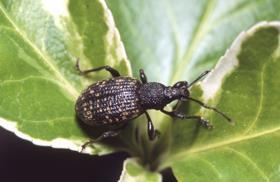
BASF has carried out new experimental work that the group said confirmed that Nemasys L (Steinernema kraussei) provides better control of black vine weevil on strawberries at a range of temperatures compared with other species of nematodes used to control this pest.
Nemasys L is manufactured in the group's production facility in Littlehampton, which prides itself as being one of the best in terms of quality.
Rob Storer of BASF said that the trials on black vine weevil compared Nemasys L with a number of other parasitic nematode products.
“We initiated this work originally to prove once and for all that Nemasys L works just as well at warmer temperatures as at lower ones,' Storer explained. 'The temperature data for this trial ranged from a high of 40°C down to below minus 5°C.
'Nematodes were applied at 25,000 per plant, and Met 52 OD at 0.05 ml/plant on the 31st August 2017,' he continued. 'The untreated suffered nearly six vine weevils per plant; Nemasys L reduced this to less than one per plant, which was the best treatment in the trial. Met52 resulted in 5.2 weevils per plant, Nemtrident H 5 per plant, Nema-top 4.2, Larvanem 4.1 per plant.
“Nemasys L (Steinermema kraussei) is nematode that controls the immature stages of the black vine weevil in strawberries and other crops under a wide range of temperatures,' he added. 'Nemasys L is effective at all times and across a soil temperature range of 5 ºC to 30ºC, when the larvae are active and feeding.'
Black vine weevil (Otiorhynchus sulcatus) is a devastating pest of many plants, particularly soft fruits, glasshouse ornamentals and nursery stock. It feeds on over 140 different plant species, and on strawberries alone they are thought to be responsible for losses of over £10m each year.
“This assured activity across a wide temperature range added to its high quality formulation is what differentiates Nemasys L from other nematode products,” Storer outlined.
Nemasys L can be applied using standard spray applicators. Drench application is preferred, particularly where canopies are dense. New plant material coming into the nursery should always be treated as it may contain vine weevil larvae.
As well as being effective at warm and low temperatures, Nemasys L has no resistance problems, no residue concerns, no re-entry interval, no requirement for protective clothing and no disposal restrictions, the group explained.
Storer said that “there is increasing pressure for effective pest and disease control in specialist crops, particularly fruit crops, but there are more legislative and practical challenges for growers. We need effective alternative options in speciality crops and Nemasys L provides this. BASF are developing market-leading science in both conventional and biological approaches.”



